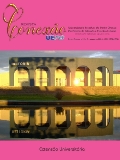THE STUDENTS’ CONCEPCIONS ABOUT USING LUDIC PRACTICES IN A BLOOD CENTER THROUGH AN OUTREACH PROJECT - DOI: 10.5212/Rev.Conexao.v.12.i3.0007
DOI:
https://doi.org/10.5212/Rev.Conexao.v.12.i3.0007Keywords:
Teacher Training, Ludic Practices, Blood Center.Abstract
This study aims to report the challenges and the reflections of students of Pedagogy and Physical Education about an outreach project carried out in Paraná. The project is developed in a blood center with people who have different blood disorders, such as Hemophilia, Thalassemia, Sickle Cell Anemia, among others. The methodology used was the analysis of questionnaires answered by seven participants of that project, with subjective questions about their perspectives and insights about their performance. As a result, it was possible to conclude that the outreach project gives a new impetus to the practice of its participants, allowing them to cope with queries and their initial impressions about patients. The theoretical principles of social education contribute to deal with patients so that they understand the importance of health care as well as the struggle to guarantee their rights. The project allows patients to interact with each other and build collective solutions to their problems as well as having fun with the activities and games. It also contributes significantly to the training process and to the human and social aspects of the group members.
Downloads
References
BARDIN, L. Análise de Conteúdo. Lisboa: Edições 70, LDA; 2009.
BRAGA, J. A. P. Medidas gerais no tratamento das doenças falciformes. Rev. Bras. de Hematologia e Hemoterapia. 2007, 29(3): 233-238.
Associação Brasileira de Talassemia. O que é Talassemia. [publicação online]. São Paulo, 2016. [acesso em 01 Ago. 2016] (Definição de Talassemia). Disponível em http://www.abrasta.org.br/definicao-talassemia
BRASlL. Lei 8.069 de 13 de julho de 1990. Dispõe sobre o Estatuto da Criança e do Adolescente e dá outras providências. Diário Oficial da União. 13 jul 1990.
BRASIL, Federação Brasileira de Hemofilia. O que é Hemofilia. [publicação online]. São Paulo, 2016. [acesso em 18 Fev. 2016] (Definição de Hemofilia) Disponível em http://www.hemofiliabrasil.org.br/hemofilia/o-que-e/
GAZZINELLI, M. F et al. Educação em Saúde: conhecimentos, representações sociais e experiências com doenças. Cad. de Saúde Pública. 2005, 21(1): 200-206
INVERNIZZI, L.; VAZ, A. F. Tempo e conhecimento na educação física dos primeiros anos do ensino fundamental em classe hospitalar: algumas questões. Ágora para la ef y el Deporte. 2015,18(1),49-60.
LIEBERMAN, D. A. Interactive vídeo games for health promotion: Effects on knowledge, self-efficacy, social support, and health. Sreet, W. R. Gold, W. R. Mannings, organizadores. Helth promotion and interactive Technology: Theoretical applications and future directions. Lawerence Erlbaum Associates; 1997. p. 103-120.
MÜLLER, V. R.; et al. A formação do profissional da Educação Social: espectros da realidade. In: XVIII Seminário Internacional de Formação de Professores para o MERCOSUL/CONE SUL. Anais eletrônicos. 03-05 nov 2010; Florianópolis: 2010. p. 446-456.
NATALI, P. M. Formação profissional na Educação Social: Subsídios a partir de experiências de educadores sociais latino americanos. [Tese de Doutorado]. Maringá: Universidade Estadual de Maringá, 2016.
OLIVEIRA, L. S. Brincar (es) na infância: possibilidades no contexto da doença falciforme e da Hemofilia. (Dissertação de Mestrado) Juiz de Fora: Universidade Federal de Juiz de Fora, 2010.
PAULA, E. M. A. T.; FOLTRAN, E. P. Brinquedoteca hospitalar: direito das crianças e adolescentes hospitalizados. Revista Conexão UEPG. 2007, 3(1), p.22-25.
SOUZA, C. R. T. Educação Social e Avaliação: Indicadores para contextos educativos diversos. [Tese de Doutorado] Maringá: Universidade Estadual de Maringá, 2016.
VYGOTSKY, L. S. O papel do brinquedo no desenvolvimento. In: VYGOTSKY, L. S. A formação social da mente. São Paulo: Ed. Martins Fontes, 1991. p.61-69.
Downloads
Published
Issue
Section
License
a) Authors retain copyright and grant the journal right of first publication with the work simultaneously licensed under a Creative Commons Attribution License that allows others to share the work with an acknowledgement of the work's authorship and initial publication in this journal.
b) By submitting an article to the Revista Conexão UEPG and having it approved, the authors agree to assign, without compensation, the following rights to the Journal: the rights of first publication and the rights to redistribute the article and its metadata to the indexing and reference services that the editors deem appropriate.
c) Readers are free to transfer, print out and use the articles published in the Journal, as long as there is always explicit mention to the author(s) and to the Revista Conexão UEPG and as long as there is no alteration of the original work. Any other use of the texts needs to be approved by the author(s) and by the Journal.






